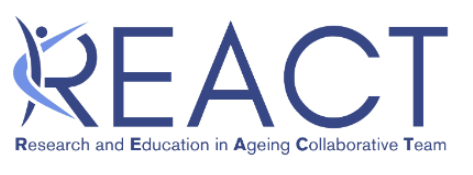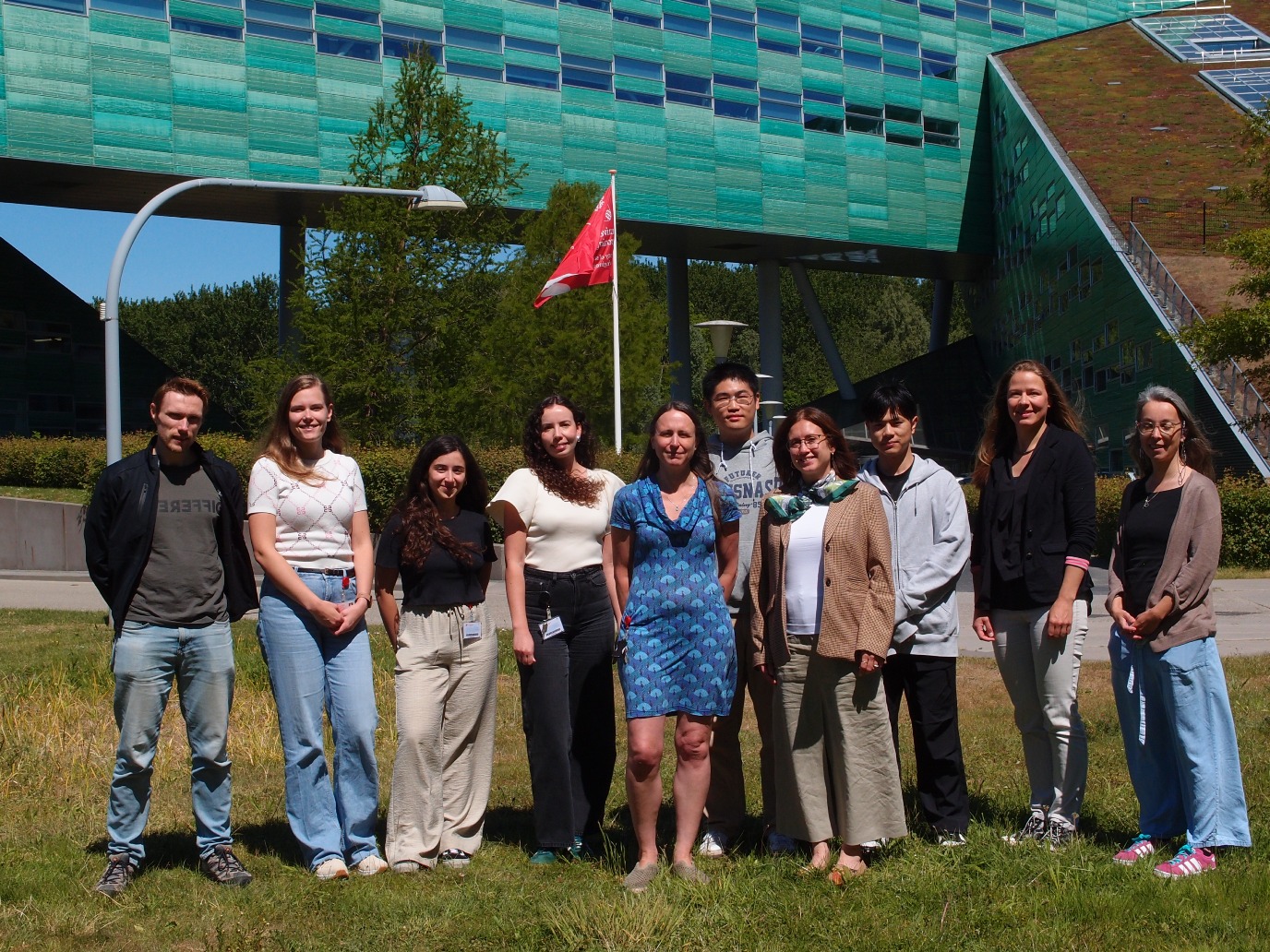REACT and the Future of Ageing

What is this project about?
Europe’s aging population currently costs 1.7% of GDP, but is predicted to increase to at least 26% by 2070, due to an expected average of 15 years of later-life in poor health. We therefore need to improve health in later-life, but this is impeded by limited understanding of age-associated conditions and a lack of biomarkers to detect ageing-related conditions. REACT stands for Research and Education in Ageing Collaborative Team. REACT focuses on research, education, and community engagement in the field of ageing, aiming to positively impact the health and well-being of our ageing society. We are a network of researchers from six ENLIGHT universities (Basque Country, Bern, Galway, Ghent, Groningen, and Tartu).
We need research to advance biomarker development, and target personalised preventative and therapeutic approaches to increase healthy life expectancy.
Why is this important?
There is an increasing gap between life expectancy and healthy life expectancy that urgently needs addressing. The negative impact of ageing-associated conditions on older people, their families, carers and societies is unsustainable. We need research to advance biomarker development, and target personalised preventative and therapeutic approaches to increase healthy life expectancy.
Reducing the time spent in poor health in later-life is not achievable by individual researchers, and requires an international team approach. REACT aims to address this gap by developing a highly integrated network of researchers with complementary expertise and resources in ageing. For example, REACT members at the University of Groningen bring expertise in neurobiology, linguistics and the evolution of ageing, that complement the physiological, immunological, endocrinological and pharmaceutical expertise of the other REACT partners. We also bring together expertise in different state-of-the-art technologies and access to multiple resources, such as datasets, pre-clinical models, and clinical trials. This will enable us to drive advances in research, education and community engagement in the field of ageing.
Our network is a success story formed from one of the ENLIGHT match-making events, which allowed us to connect with researchers tackling ageing from very diverse perspectives. From the resulting database it was clear that there was an abundance of disparate but complementary expertise across the ENLIGHT universities on ageing research. The ENLIGHT ETN therefore provided a fantastic opportunity to build a network of researchers in the field of ageing research.
How does your project connect to other ongoing projects?
We have a large and diverse membership from the University of Groningen bringing researchers with skills in theoretical evolutionary ecology, genomics, quantitative genetics, behaviour, the microbiome, linguistics and neurobiology. For example, we have projects on evolutionary medicine where we apply modern evolutionary theory to the study of ageing, which will be beneficial to REACT research, especially for the clinical partners. Our neurobiology experts provide both expertise in age-related brain changes and how that affects pathological ageing and dementia. Additionally, we have experience with developing e-Learning modules on sex and gender differences in neurodegenerative disease which will contribute to the team’s education plans, and inspire community engagement activities.
What are the future directions of the project?
We have already established an early-career researchers network, and our first seminar is highlighting the research of University of Groningen members. We are currently busy organising our first in-person workshop that will also take place in Groningen, in September, to identify collaborative routes. For example, we want to facilitate staff exchanges to transfer knowledge, and build educational activities with the major aim of establishing an ENLIGHT Masters programme with jointly-designed and delivered modules in ageing.
We recognise the importance of training and mentoring early-career researchers, to conduct better research that is applicable to clinical practice and society. We are therefore committed to establishing a mentoring programme for REACT early-career researchers to advance their careers as future researchers and clinical leadership in the field of ageing. We are also developing public engagement through fostering participatory initiatives, for example, we will be organsing a public lecture on ageing in Groningen, to coincide with world DNA day next year.

The UG Team
|
Faculty
|
Name
|
Role
|
Email
|
|
Groningen Institute for Evolutionary Life Sciences |
Prof. Hannah Dugdale |
Principal Investigator |
h.l.dugdale@rug.nl |
|
Groningen Institute for Evolutionary Life Sciences |
Dr. Nicole Gervais |
Principal Investigator |
n.j.gervais@rug.nl |
|
Groningen Institute for Evolutionary Life Sciences |
Dr. Yağmur Erten |
Principal Investigator |
e.y.erten@rug.nl |
|
Groningen Institute for Evolutionary Life Sciences |
Euan Young |
PhD students |
e.a.young@rug.nl |
|
Groningen Institute for Evolutionary Life Sciences |
Claire Tsui |
PhD students |
l.s.tsui@rug.nl |
|
Groningen Institute for Evolutionary Life Sciences |
Sen Dong |
PhD students |
s.dong@rug.nl |
|
Groningen Institute for Evolutionary Life Sciences |
Lingwang Kong |
PhD students |
lingwang.kong@rug.nl |
|
Groningen Institute for Evolutionary Life Sciences |
Danique Zantinge |
PhD students |
d.c.zantinge@rug.nl |
|
Groningen Institute for Evolutionary Life Sciences |
Luisa Epifani |
PhD students |
l.epifani@rug.nl |
|
Groningen Institute for Evolutionary Life Sciences |
Caterina Stacchiola |
PhD students | |
|
Groningen Institute for Evolutionary Life Sciences |
Freya Darling Eriksen |
PhD students |
f.d.eriksen@rug.nl |
|
Groningen Institute for Evolutionary Life Sciences |
Dr. Pablo Gallardo |
Post doc |
p.a.gallardo.molina@rug.nl |
|
Groningen Institute for Evolutionary Life Sciences |
Dr. Natalia Orti Casan |
Post doctoral Fellow |
n.orti.casan@rug.nl |
|
Groningen Institute for Evolutionary Life Sciences |
Prof. Robbert Havekes |
Principal Investigator |
r.havekes@rug.nl |
|
Groningen Institute for Evolutionary Life Sciences |
Prof. Jan Komdeur |
Principal Investigator |
j.komdeur@rug.nl |
|
Groningen Institute for Evolutionary Life Sciences |
Prof. Peter Meerlo |
Principal Investigator |
p.meerlo@rug.nl |
|
Groningen Institute for Evolutionary Life Sciences |
Dr. Marjon de Vos |
Principal Investigator |
m.g.j.de.vos@rug.nl |
|
Groningen Institute for Evolutionary Life Sciences |
Dr. Sanne Moorman |
Principal Investigator |
s.moorman@rug.nl |
|
Faculty of Arts |
Dr. Defne Abur |
Principal Investigator |
d.abur@rug.nl |
|
Faculty of Arts |
Katharina Polsterer |
PhD student |
k.m.polsterer@rug.nl |
|
Faculty of Behavioral and Social Sciences |
Dr. Miles Wischnewski |
Principal Investigator |
m.wischnewski@rug.nl |
|
Groningen Institute for Evolutionary Life Sciences |
Prof. Gertjan van Dijk |
Principal Investigator |
gertjan.van.dijk@rug.nl |
|
Groningen Institute for Evolutionary Life Sciences |
Dr. Marianthi Tangili |
Post doc |
m.tangili@rug.nl |
More news
-
15 September 2025
Successful visit to the UG by Rector of Institut Teknologi Bandung
